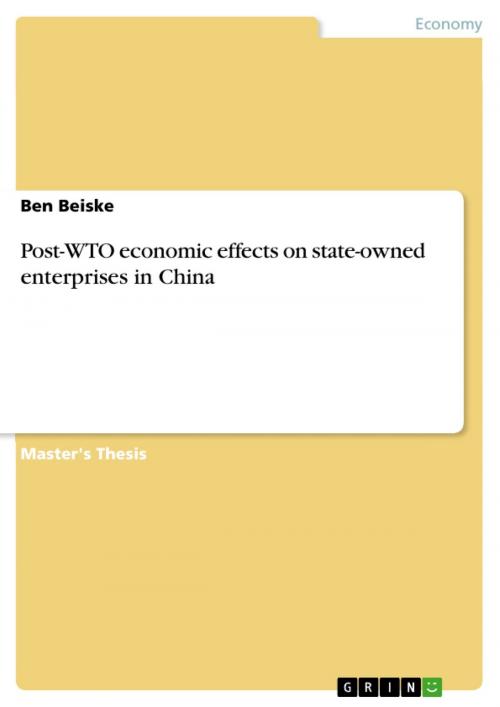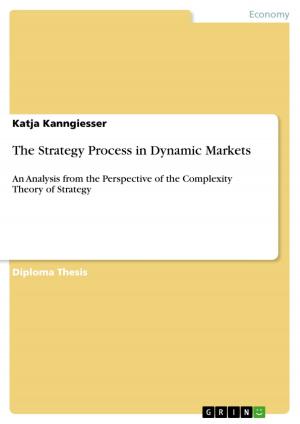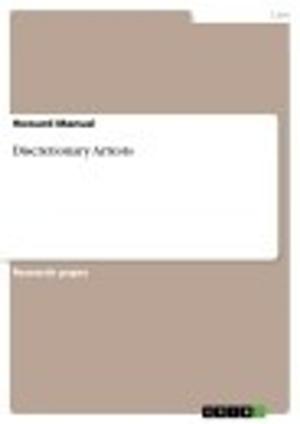Post-WTO economic effects on state-owned enterprises in China
Nonfiction, Social & Cultural Studies, Political Science, Politics, Economic Policy| Author: | Ben Beiske | ISBN: | 9783638222815 |
| Publisher: | GRIN Publishing | Publication: | October 8, 2003 |
| Imprint: | GRIN Publishing | Language: | English |
| Author: | Ben Beiske |
| ISBN: | 9783638222815 |
| Publisher: | GRIN Publishing |
| Publication: | October 8, 2003 |
| Imprint: | GRIN Publishing |
| Language: | English |
Master's Thesis from the year 2003 in the subject Business economics - Economic Policy, University of Manchester (Manchester School of Management), 103 entries in the bibliography, language: English, abstract: The importance of the World Trade Organisation (WTO) for international free trade today has enticed China to join the WTO in December 2001. The significance of WTO membership for China cannot be underestimated, inevitably speeding up much-needed economic reform in the country. The gradual transition from a planned- to a market-economy is expected to continue in the future. The severity of the impacts for the economy will depend on how successful China is in providing policies that will assist the nation in the major adjustment problems that it faces in the future. The expected, actual, and needed implications for China's state-owned enterprises (SOEs) resulting from WTO membership will be investigated in detail; in the process, the significance of SOEs to the Chinese economy will be highlighted. SOEs are mostly ill- prepared for a post-WTO China, and the dismal state of these companies has already led to the decline of market share in the past decade. For the future, the retreat of the state is likely to continue. The main implications for SOEs from China's WTO membership are seen in the areas of competitiveness, corporate governance, privatisation, mergers and acquisitions, property rights, unemployment, and attracting and retaining qualified personnel. This dissertation offers one of the most detailed insights into the challenges facing China's SOEs and the implications of China's WTO membership for these companies, while also highlighting the areas that require future attention. The understanding of the role and meaning of SOEs for the Chinese economy is of immense importance for foreign investors wanting to invest in the country, already cooperating with China's SOEs, or looking into the possibility of such.
Master's Thesis from the year 2003 in the subject Business economics - Economic Policy, University of Manchester (Manchester School of Management), 103 entries in the bibliography, language: English, abstract: The importance of the World Trade Organisation (WTO) for international free trade today has enticed China to join the WTO in December 2001. The significance of WTO membership for China cannot be underestimated, inevitably speeding up much-needed economic reform in the country. The gradual transition from a planned- to a market-economy is expected to continue in the future. The severity of the impacts for the economy will depend on how successful China is in providing policies that will assist the nation in the major adjustment problems that it faces in the future. The expected, actual, and needed implications for China's state-owned enterprises (SOEs) resulting from WTO membership will be investigated in detail; in the process, the significance of SOEs to the Chinese economy will be highlighted. SOEs are mostly ill- prepared for a post-WTO China, and the dismal state of these companies has already led to the decline of market share in the past decade. For the future, the retreat of the state is likely to continue. The main implications for SOEs from China's WTO membership are seen in the areas of competitiveness, corporate governance, privatisation, mergers and acquisitions, property rights, unemployment, and attracting and retaining qualified personnel. This dissertation offers one of the most detailed insights into the challenges facing China's SOEs and the implications of China's WTO membership for these companies, while also highlighting the areas that require future attention. The understanding of the role and meaning of SOEs for the Chinese economy is of immense importance for foreign investors wanting to invest in the country, already cooperating with China's SOEs, or looking into the possibility of such.















